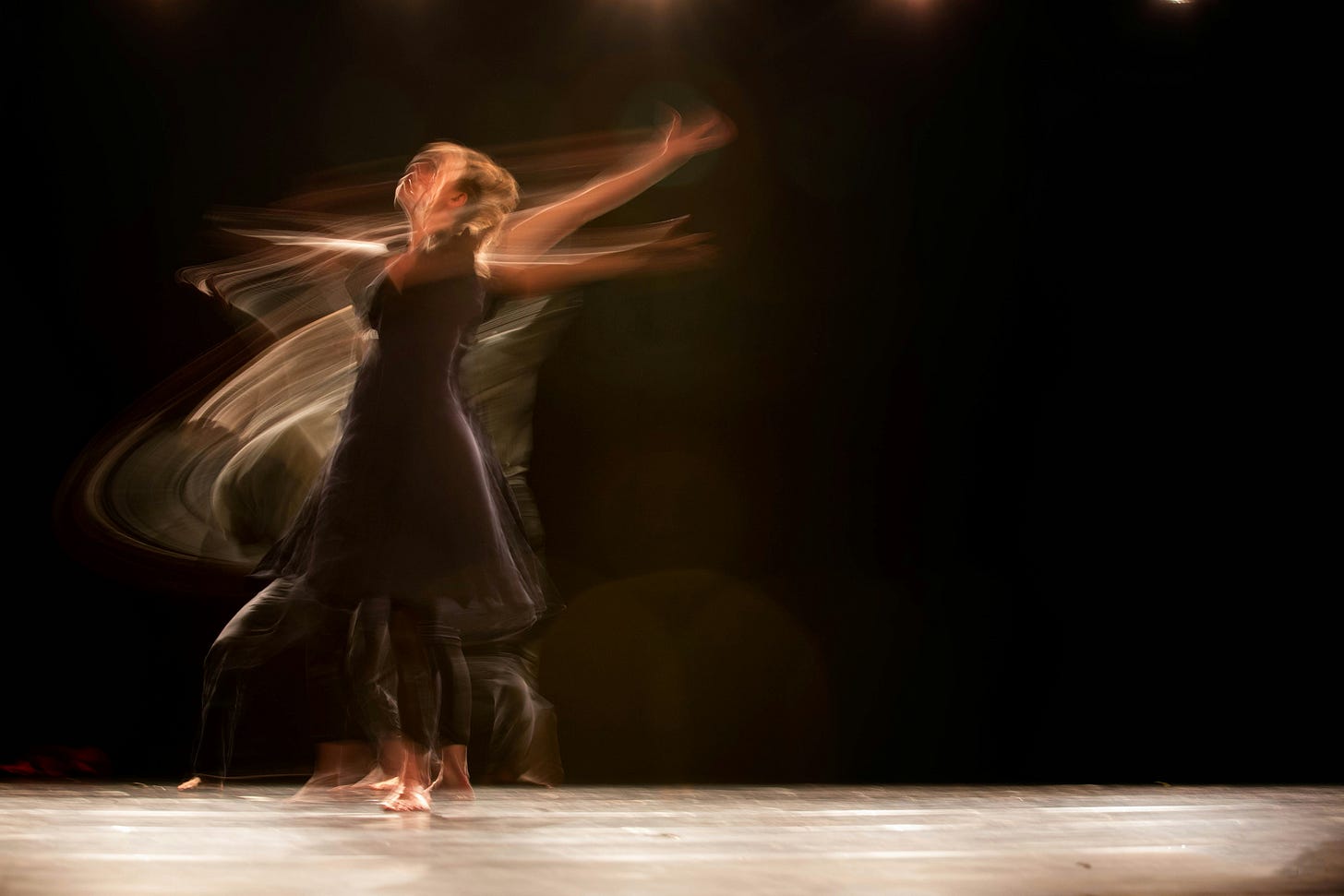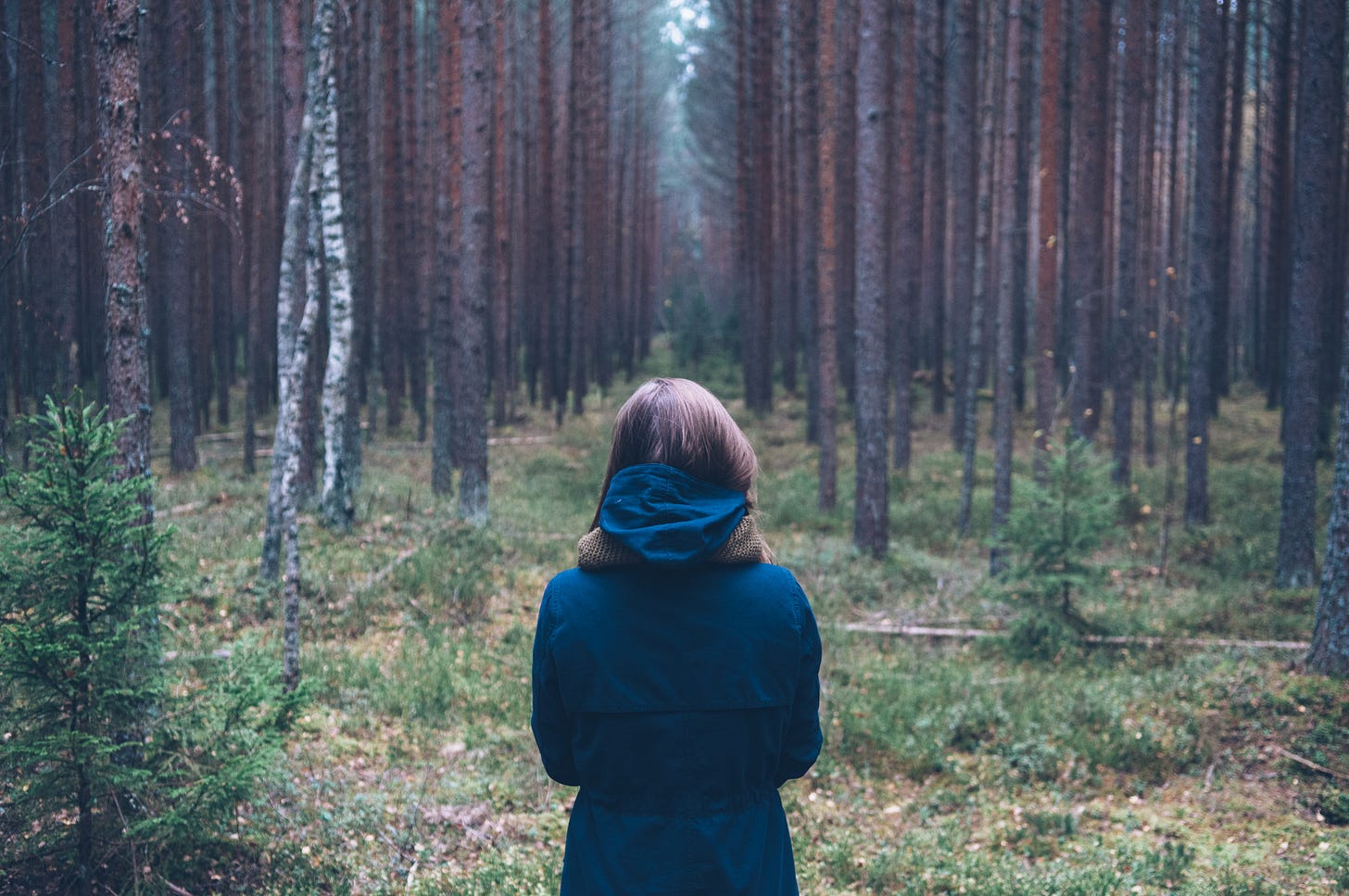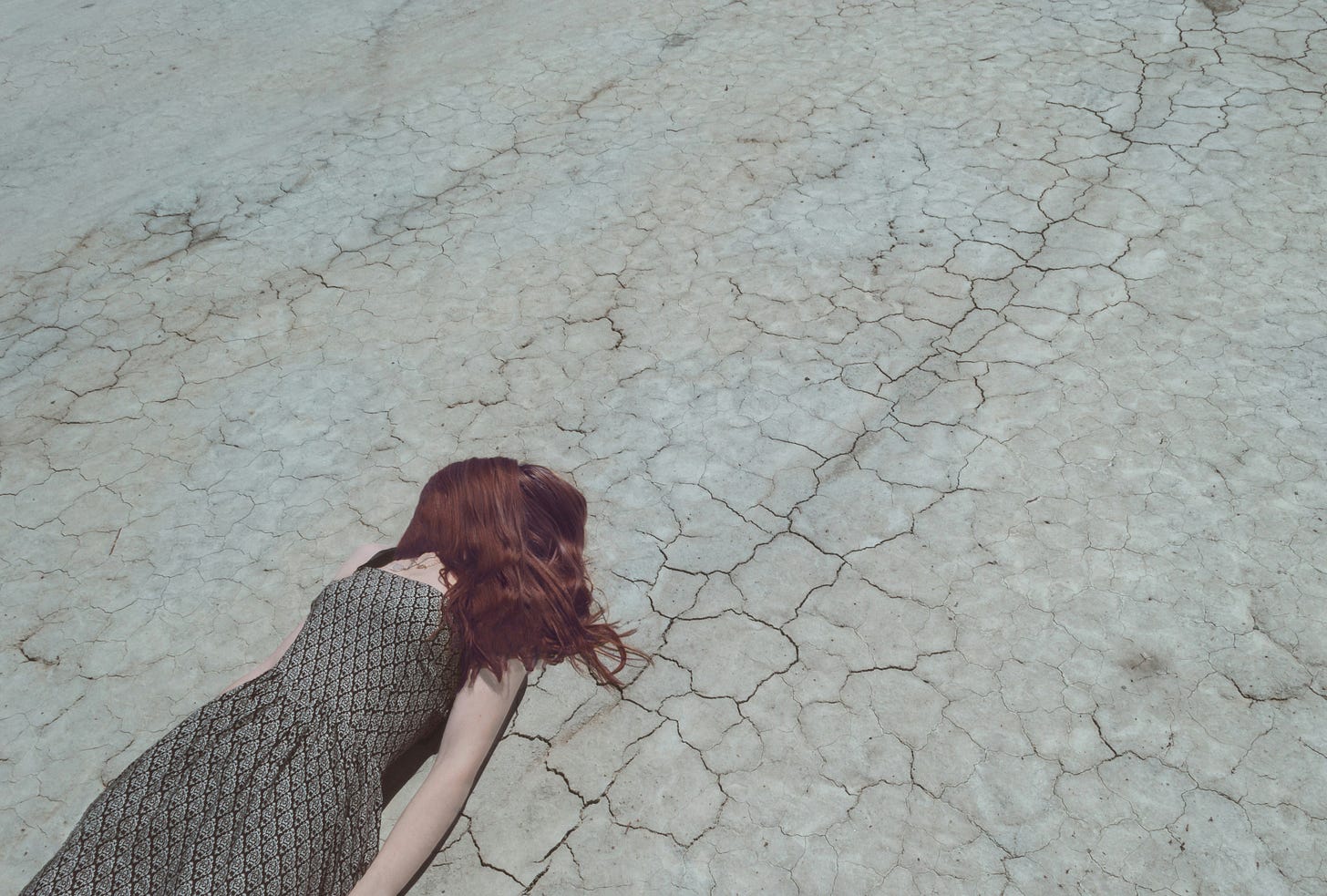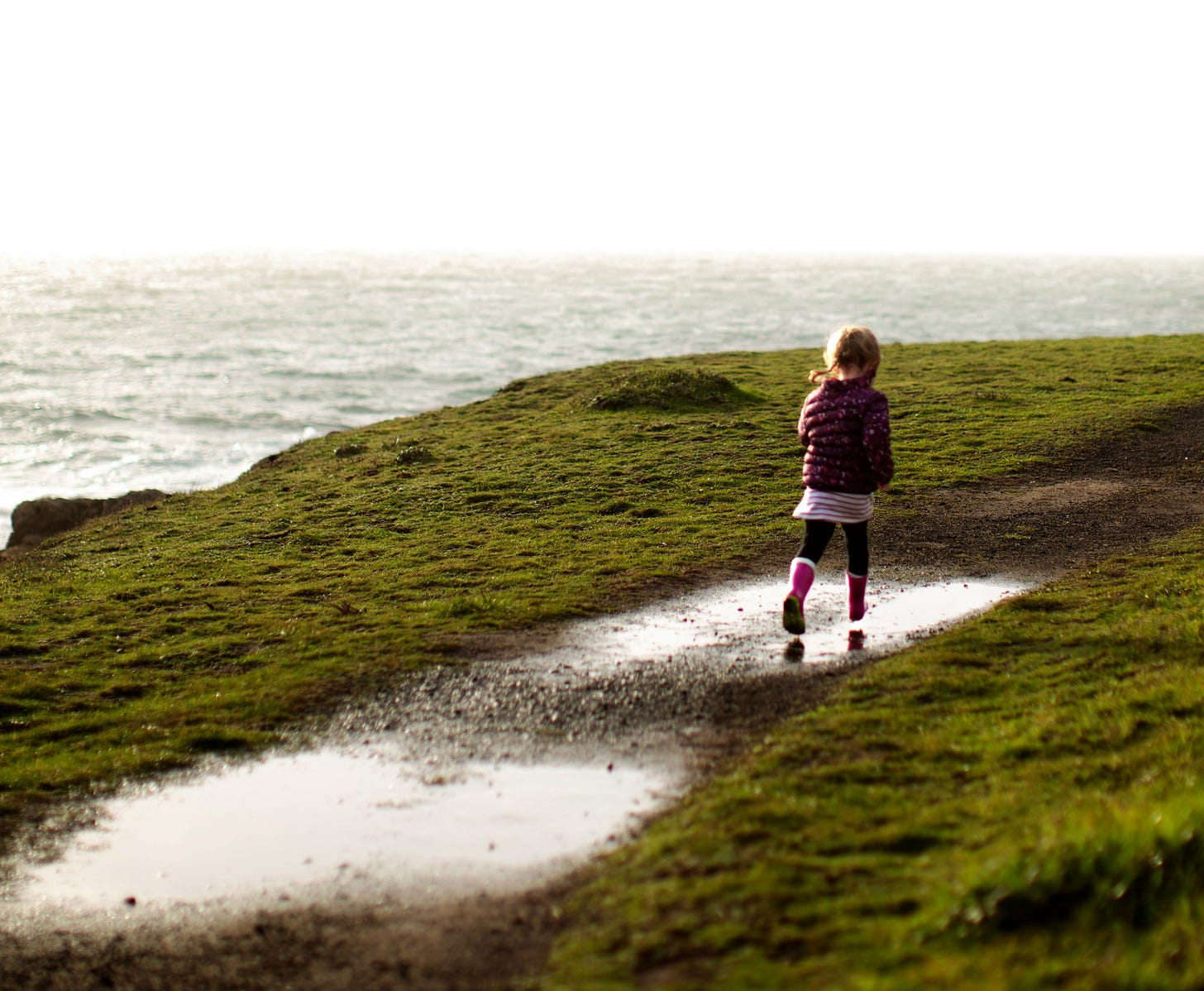It's OK to cry. And it's OK to sing, dance and laugh.
How I'm finding courage in the chaos and wonder in the wilderness
I spent this last week in sporadic fits of tears, of cries of rage and grief. Some of this was on a dance floor in a church among other sober revellers, as a German DJ rolled out a heady mix of dark and uplifting trance beats for his ecstatic dance set. Some of it was quietly on my own at home, in my car and whilst watching a film in the cinema about loss, betrayal and how the uncompromising, unpredictable forces of nature can heal and empower us.
I have also spent the last week gazing at the ocean. Noticing the glow and smell of the summer flowers after a rain shower. And laughing and singing, on my own, to ‘I Feel Pretty’ from West Side Story and ‘The Farmer and the Cowboy should be friends’ from Oklahoma (the sad and sorry relevance of these two musicals for today’s US political landscape is not lost on me).
And I have spent it sitting in a grief circle with people in my neighbourhood who I know nothing about, except that we all have lost someone we love and we all struggle to navigate this in a society that expects us to just move on and not talk about it.

Making space for grief and loss
These are just some ways in which I make it through each day, in the midst of poly-crisis and my own personal grief. It is how I allow space for all that I am feeling about Israel’s actions in Gaza, the West Bank and now Iran, and all that I am feeling about the violence against peaceful protestors on the Freedom Flotilla and Global March to Gaza.
It also gives me space for the sadness in my own life. We all have these, and yet we so often push them aside, do not give them our full attention, or let others see them. In the last two years or so, I have had to come to terms with no longer have parents in my life. Only in the last two weeks have I managed to sell my father’s house - so I am also now coming to terms with no longer have a family home to visit.
I am also currently mourning the loss of my humanitarian career; or at least in its current form, as the aid sector that I have spent over 20 years working within faces an unprecedented funding crisis. This follows the closure of USAID by the Trump Administration, and further cuts to development and humanitarian spending by our own UK Labour government. All of which have devastating consequences for hundreds of thousands of people living in situations of conflict and violence, famine and climate emergency who depend on foreign aid for their survival.
I navigate these huge upheavals with barely any close family members to turn to for emotional support, and without a partner or children to keep me busy or direct my attentions towards.
I find myself in a liminal space, as major chapters in my life come to an end – most of them not out of choice – and I have no idea what happens next, what direction to take and what my life could or should look like.

Unlearning the culture of busyness and denial
In these sorts of moments, I feel and hear the life-long conditioning that orders me to push through and just get on with it; that tells me that I am not allowed to feel my pain and that I am of no value unless I’m doing something and staying busy. The messaging that sees slowing down, taking time to rest and to heal as self-indulgent.
And taking time to be still and do nothing when everything feels chaotic and uncertain can feel scary anyway. We’re so programmed to find solutions, to control and predict outcomes, that when we slow down and realise we perhaps don’t have as much control as we thought it can be terrifying.
I have had those moments too, over and over again, the last few weeks and months; as I watch global systems collapse, violence and oppression escalate, and my own life be knocked sideways.

And yet it is in the quiet, in the slowing down and listening, that I can hear the inner voice that tells me this is exactly what I have to do – this is exactly how I have to be.
This space for emotional processing, whether alone or with others, is part of how we resist the culture that tells us to ignore or deny our feelings and just move on. And it is how we acknowledge that our sadness, our grief, our rage matter if we want to stay connected with, and have empathy for, human suffering in all its forms. It is how we dream into new ideas and visions about how we can live differently, more compassionately, more respectful of the more-than-human environment. And how we can restore hope that, as we navigate the poly-crisis, another world is possible.
Practices to help us feel, heal and let go
Returning to my tears and my laughter over the last week, I have found these core practices help whatever is stuck or unseen within me to reveal itself, move through me and be released in a gentle way.
Moving the body. I mean REALLY moving the body. Shaking, dancing, allowing myself to move naturally to music I love, without performance or self-consciousness. Remembering the child within me who wants to be Maria singing I Feel Pretty or Anita singing ‘I Want to be in America’ in West Side Story (again, the irony is not lost on me). Or reconnecting with the older version of me who may not be able to articulate my pain in words, but can express it when moving to drum n’ bass or techno, or for that matter Skunk Anansie or Rage against the Machine.
Writing. Yes, I love to write and I am an author. But recently I have been writing a lot without purpose, just to let my emotions flood out onto the page. Often first thing in the morning, and often in a global online community of over 200 other writers - through the wonderful London Writers Salon. Joining their daily Writers’ Hour is a way for me to stay committed to my writing process, even if it doesn’t result in a newsletter or blog piece or book chapter. And remember that there are hundreds of others out there doing exactly the same, who understand the healing, liberating value of this form of creative expression in and of itself.
Wonder. This was a word used by someone in the grief circle I attended last week. Finding wonder in small things that remind us of the vibrancy and potential of life. The birds’ dawn chorus. A toddler splashing their wellies in a puddle. And the human stories of overcoming huge upheavals and tragedies; we rarely see or hear these on the news but we can find them, everywhere around us. Including in the film I referred to in the introduction - The Salt Path.
Being witnessed. Connecting with others where I feel fully seen in my messiness. Where I can let go of the mask of productivity, over-achievement and suppression of vulnerability. Where my tears and my heartache are welcome. Where we can talk, or be in silence together, acknowleding our grief and our pain. Sometimes this can be with strangers, as I’m discovering. And sometimes it means putting in boundaries and being very picky about who to spend time with, being honest about where we feel safe to be ourselves and where we do not.

Photo by Jonathan Smith on Unsplash
So many of us are letting go of old identities, beliefs and routines that we took for granted or that were simply part of our unconscious programming for decades. I see this as the poly-crisis in microcosm; it is how we are feeling the collective grief and uncertainty of systems collapse in our own bodies and personal circumstances.
I know it’s hard, and some days it can feel impossible. I hope we all find practices that support us to cultivate courage in the chaos, and wonder in the wilderness. Would love to hear from you if my suggestions resonate, and if you have practices of your own that support you.


